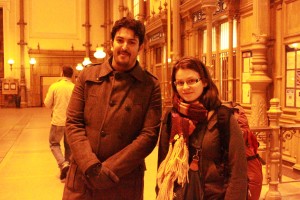This is the continuation of the interview with Diana Lesko, the Project Manager, and Taha Sharif, the Content Manager from the EuroArab project.
What is for you personally the best thing about Europe and/or European culture?
Diana Lesko (DL): It gives me a lot of opportunities to travel in and outside of Europe. I can freely go anywhere I want. As for European culture, what I like the most is that I can make free choices about my life and nobody tries to interfere.
Taha Sharif (TS): Well, I very much enjoy European cuisines and sport.
What is for you personally the best thing about Arab countries and/or Arabic culture?
DL: I adore their hospitability, generosity and caring. I spent some time in Egypt, Tunisia and Morocco. I was hosted by Arab families who treated me as their own child in their house, and my Arab friends took care of me from the second I entered the country until the second I left the country with a lot of consideration, respect and care.
TS: I believe one of the best things about Arab culture is the social coherence. Family means a lot to Arabs. Caring for the elderly in the family is a duty, but that each Arab does spontaneously.
What has been the biggest challenge for you so far as being a part of EuroArab project?
DL: The biggest challenge is how we, the EuroArab teame working from many different countries can reach young people in Europe and the Arab world. Also, we have to accept that we have different ways of communication and understanding things – in a sense, different maps of the world that may arouse clashes and conflict.
TS: As we have just begun the project, I do not recall any challenges. But, even if I happen to face a challenge, I truly believe in the EuroArab team’s spirit to tackle whatever might face us. And I should mention our project’s coordinator, Diana, who has chosen a team of Arabs and Europeans members with a great sense of responsibility and wisdom.
Can you give us an example of a positive EuroArab cooperation?
DL: For example, in our team, for each position there is an Arab and European responsible. While working together on  the same tasks, they are sharing their own perspectives which can be very different because we are coming from very different cultural backgrounds. Having included all the different perspectives makes our work very unique. Last but not least, while working we are also learning many things about each others’ country.
the same tasks, they are sharing their own perspectives which can be very different because we are coming from very different cultural backgrounds. Having included all the different perspectives makes our work very unique. Last but not least, while working we are also learning many things about each others’ country.
TS: Surely, there are many cooperation treaties between Arabs and Europeans. Be they on a state level or the level of the Arab League and the European Union. Unfortunately, there are not as many youth oriented initiatives as there should be. The EuroArab project is a great example which would strengthen youth cooperation in both regions on many levels.
How do you see the future of the next two years of EuroArab? What can we expect both individually and as AEGEE?
DL: As an individual, I expect that I will have a deeper and wider knowledge about what concerns the Arab youth. As for AEGEE, I expect that there will be more AEGEEans knowing more about the Arab youth and their culture. I would like to see more friendships and youth cooperation developing between young Arabs and AEGEEans. Moreover, I expect that having gained more knowledge about each other we, European youth, will reduce the negative stereotypes we have stamped on each other. Naturally, the events and case study trips we are going to organize during these two years won’t reach everyone as each of the events is for a certain number of people. Therefore, we have to go beyond that. We want to have online forums where we would facilitate discussions and offer platforms for getting to know each other, form relationships and accomplish projects together. This might sound really simple, however it’s very important, and it requires determination and effort – which I hope the young people will have and make.
TS: I expect EuroArab to be embraced by wide youth networks in both regions. These networks would be the backbone of our cooperative activities and our endless support towards youth issues in both regions. As an AEGEE’s member I believe this would accomplish one of the main aims of AEGEE: “striving to create an open and tolerant society for today and tomorrow and fostering democracy, human rights, tolerance and cross border cooperation”.
EuroArab team members and responsibilities
Diana Lesko, AEGEE-Debrecen, Hungary – Project Manager
Stephanie Müller, AEGEE-Heidelberg, Germany – Financial Manager
Taha Shariff, Khartoum, Sudan & Karolina Mazetyte, AEGEE-Kaunas, Lithuania – Content Managers
Mariem Ben Ltaifa, Sousse, Tunisia & Hazal Melike Akboga, AEGEE-Ankara, Turkey – HR Managers
Mazen Elhalfawy, Alexandria, Egypt & Irinelu Iacoban, AEGEE-Chisianu, Moldova – PR Managers
Orabi Nakhleh, Ramallah, Palestine & Marlen Osmanov, AEGEE-Sevastopol, Ukraine – IT Managers
Said Bakkali, Tangier, Morocco & Alfredo Sellitti, AEGEE-Salerno, Italy – FR Managers
Agnija Kazuša, AEGEE-Ogre, Latvia – Press Team, Journalist
Ahmed Wahid, Cairo, Egypt – Graphic Designer
Dita Dlabolova, AEGEE-Brno, Czech Republic – Video Editor
Morgane Hoarau, AEGEE-Krakow, Poland – Content Team member
Oliver Andersson Hugemark, Kristinehamn, Sweden – Content Team member
Sandra Oborska, AEGEE-Krakow, Poland – Content Team member
Kate Jenkins, AEGEE-Durham, United Kingdom – English Proofreader
Written by Agnija Kazuša, AEGEE-Ogre
Proofread by Kate Jenkins, AEGEE-Durham

